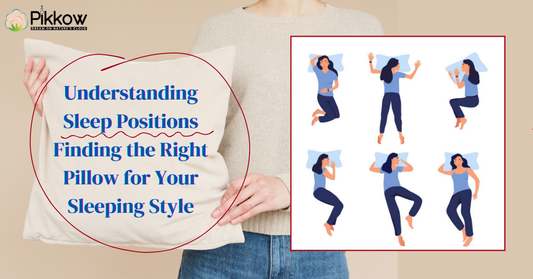Sleep is a cornerstone of health, yet millions of people struggle with sleep disorders that significantly affect their quality of life. While treatment varies, one essential yet often overlooked factor is the right pillow for sleeping. A good pillow provides the proper support and alignment needed for restful, restorative sleep. In this blog, we’ll discuss the top five sleep disorders and explore how the right pillow prevents health problems. If you’ve ever wondered how to find the right pillow or how to choose the right pillow, read on—we’ve got all the answers.
Understanding Sleep Disorders
1. Insomnia
Insomnia is the most common sleep disorder, affecting nearly 10% of adults. It involves difficulty falling asleep, staying asleep, or both. Chronic insomnia can lead to fatigue, mood swings, and impaired concentration, significantly impacting daily life. Causes range from stress to underlying medical conditions.
How the Right Pillow Helps
The right pillow for sleeping can promote relaxation and help maintain consistent sleep posture, which is crucial for individuals with insomnia. Memory foam or ergonomic pillows can offer additional comfort, reducing the tossing and turning that exacerbates sleeplessness.
2. Sleep Apnea
Sleep apnea is a serious condition where breathing repeatedly stops and starts during sleep. This disorder often results in loud snoring, disrupted sleep, and excessive daytime sleepiness. It also increases the risk of heart disease and stroke.
How the Right Pillow Helps
Specialized pillows designed for individuals with sleep apnea, such as wedge pillows, can elevate the head and open the airway. By improving airflow, these pillows not only improve sleep quality but also reduce the risks associated with untreated sleep apnea.
3. Hypersomnia
Hypersomnia is characterized by excessive daytime sleepiness despite adequate nighttime rest. Those with hypersomnia may experience sudden sleep attacks, making daily activities challenging.
How the Right Pillow Helps
Using a pillow that supports proper neck and spinal alignment can lead to more restorative sleep at night, reducing the symptoms of hypersomnia. For those who struggle with waking up refreshed, how to choose the right pillow becomes a critical question to address.
4. Circadian Rhythm Disorders
These disorders disrupt the natural sleep-wake cycle, making it hard to fall asleep or wake up at appropriate times. Common examples include shift work disorder and delayed sleep phase syndrome.
How the Right Pillow Helps
The right pillow can help you settle into a comfortable position faster, aiding relaxation and improving the chances of falling asleep. A cooling pillow can also assist those whose schedules disrupt their body’s natural temperature regulation.
5. Parasomnias
Parasomnias include abnormal sleep behaviors like sleepwalking, night terrors, and REM sleep behavior disorder. These conditions can disrupt the sleep of the individual and others around them, often leading to safety concerns.
How the Right Pillow Helps
Comfortable and supportive pillows can reduce movement during the night. Selecting the right pillow for sleeping tailored to specific sleep positions can further prevent unnecessary disruptions.
How the Right Pillow Prevents Health Problems
Using the right pillow isn't just about comfort; it can be a game-changer in preventing health problems. Here’s how:
1. Neck Pain Relief
An ill-suited pillow can strain your neck, leading to pain and stiffness. A supportive pillow maintains the neck's natural curvature, alleviating discomfort. Back sleepers may benefit from a thinner pillow, while side sleepers should opt for a thicker option to keep the spine aligned.
2. Back Pain Prevention
Misaligned sleeping positions often lead to back pain. A proper pillow that ensures spinal alignment can prevent unnecessary pressure on the lower back. Side sleepers can add a pillow between their knees to reduce pelvic rotation, which further improves spinal health.
3. Headache Reduction
A poorly designed pillow can disrupt blood flow, leading to tension headaches or migraines. Choosing a pillow that supports the head without creating pressure points is crucial.
4. Enhanced Sleep Quality
Tossing and turning during the night? A well-chosen pillow can minimize movement and promote deeper, more restorative sleep. This is especially beneficial for individuals dealing with insomnia or hypersomnia.
5. Customized Support Based on Sleep Position
Your sleeping position matters when deciding how to find the right pillow. Here’s a quick breakdown:
- Back Sleepers: Opt for a contouring or cervical pillow to support the neck.
- Side Sleepers: A firm and thick pillow is ideal for maintaining neck alignment.
- Stomach Sleepers: A very thin pillow or no pillow prevents neck strain.
Tips on How to Choose the Right Pillow
Choosing the best pillow isn’t one-size-fits-all. Here are some tips to help you:
1. Consider Your Sleep Position
As mentioned earlier, the ideal pillow varies based on how you sleep. A good rule of thumb is to keep your neck and spine in neutral alignment.
2. Check Pillow Material
From memory foam to latex to feather pillows, the material can significantly impact your comfort. Memory foam is excellent for contouring, while latex offers durability and breathability.
3. Evaluate Firmness
Firmness levels range from soft to extra firm. If you’re unsure, medium-firm pillows are a versatile choice for most sleepers.
4. Look for Special Features
Some pillows have cooling properties, hypoallergenic materials, or adjustable lofts. If you’re wondering how to choose the right pillow, these features can make a world of difference.
Why the Right Pillow Matters
The right pillow prevents health problems beyond just better sleep. Here’s a closer look at the benefits:
- Better Posture: Proper alignment during sleep reduces stress on the spine and muscles.
- Improved Breathing: Elevating the head can reduce snoring and aid conditions like sleep apnea.
- Reduced Aches and Pains: A good pillow minimizes strain on pressure points, reducing the risk of morning stiffness.
Common Myths About Choosing a Pillow
1. Firmer Pillows Are Always Better
While firm pillows work well for some, they can be uncomfortable for others, especially stomach sleepers. Always choose based on your sleeping position.
2. One Pillow Fits Everyone
There’s no universal pillow. Personal preference and physical needs dictate the best option.
3. Expensive Equals Better
High price doesn’t guarantee comfort. Focus on quality and your specific needs rather than the cost alone.
Conclusion
Sleep disorders like insomnia, sleep apnea, and circadian rhythm disruptions can take a toll on your health, but the solution might be closer than you think. Choosing the right pillow for sleeping can make a significant difference in managing these disorders and preventing long-term health issues. Whether you’re figuring out how to find the right pillow or exploring how to choose the right pillow, the key is understanding your unique needs and preferences.
FAQs
-
Can the right pillow improve sleep quality?
Absolutely. The right pillow ensures proper alignment and comfort, promoting deeper, more restorative sleep. -
What’s the best pillow material?
It depends on your needs. Memory foam offers contouring support, while latex provides durability and breathability. -
How often should I replace my pillow?
Generally, every 1-2 years. Worn-out pillows lose support and can harbor allergens. -
Are there pillows for specific sleep disorders?
Yes, specialized pillows, like wedge pillows for sleep apnea or contour pillows for neck pain, are available. - How do I pick the right pillow for my sleep position?
Consider your position: back sleepers need contouring, side sleepers require firmness, and stomach sleepers benefit from thin or no pillows.











